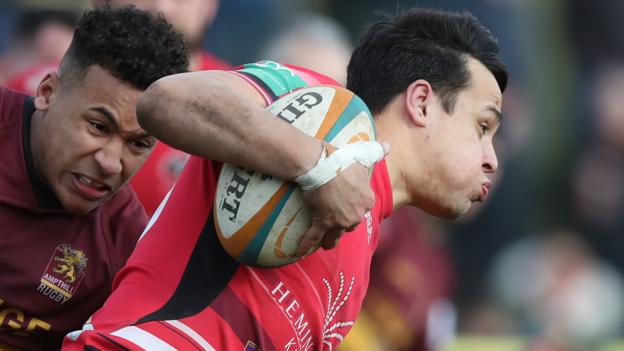
Clubs in English rugby union's second tier say they are facing losses running into millions of pounds.
The impact of the early end to the Championship season on 20 March amid the coronavirus pandemic has compounded RFU cuts to clubs' central funding.
In February, clubs were told RFU cash would drop by almost £250,000 over the next two seasons.
A number of clubs, such as Nottingham and London Scottish, have decided to become semi-professional as a result.
Coventry chairman Jon Sharp told BBC Sport he expects his side will lose around £750,000 in revenue if their operations do not start up again until September.
"We've had to make cuts, very sad as it is, because we've been building this group of players and support staff and we've now had to peel back on that," he said.
"I would say we've set ourselves back by probably two years in terms of our development trajectory."
It is a similar story at East Midlands neighbours Nottingham, who expect to lose between £300,000 and £400,000 because of the pandemic - leading to them ending their time as a fully-professional team.
"We felt that until we knew what the longer term strategy of the RFU was going to be and what we were going to be left with after Covid-19, Nottingham would be better off going semi-professional to try and make sure that we keep financially stable," said chairman Alistair Bow.
Funding cuts
The impact of coronavirus compounded an already difficult situation in the Championship.
Set up just over a decade ago, the 12-team second tier was meant to be fully professional and a pathway for young English talent to get experience before breaking into the Premiership and on into the national team.
But the RFU claimed the league's record of developing players had not been good enough - something the clubs dispute - and announced phased funding cuts that see central cash drop from £534,000 this season to £288,000 in 2022.
"I thought it was abominable," said Cornish Pirates chairman Paul Durkin.
"They said the Championship had failed to hit these five key performance indicators. We had no idea that there were key performance indicators in place, they had never been communicated to the Championship clubs".
Coventry chairman Sharp added: "They said 'you're not producing enough players through the Championship for England'.
"That really caused us to scratch our heads a bit. It certainly was not a metric we were told we were going to be measured against, but nor do we believe, in any event, that it's correct".
But it is the players in the second tier that will feel the brunt of the cuts, and coronavirus most.
Jersey Reds centre Mark Best is leaving the island side and has agreed in principle to sign for another team in the second tier.
"It's difficult to know exactly what's happening," he said.
"I think, to be honest, we (Championship players) are probably the most vulnerable compared to everyone because of the uncertainty of clubs staying professional and then the uncertainty of the league; all of that added up is the formula for disaster.
"I think a lot of boys will be out of a job when the season does get under way. I do think that a lot of boys will lose out on the opportunity to play professionally and obviously you have to prepare for the worst scenario."
Financial uncertainty
A particular worry for clubs is that, following the announcement of their funding cuts, they are still yet to receive official confirmation over the level of funding they will receive from the RFU from next season onwards.
"We would like immediate confirmation that the funding that we've talked about over the last few months is secure, that it's going to be paid in accordance with what we've already discussed, and that there'll be no interruption in those payments," Nottingham chairman Bow added.
"That would enable us to plan going forward."
BBC Sport contacted the RFU for comment but is yet to receive a response.
With some professional sport returning to action behind closed doors, there is a possibility that may be the only safe way for Championship rugby to proceed.
However, given the proportion of revenue Championship clubs generate through gate receipts, that prospect worries second-tier sides.
"For Championship clubs in general, home crowds are really the lifeblood," added Cornish Pirates chairman Durkin.
"To play behind closed doors is going to be pretty hard."
Coventry chairman Sharp added: "We would have no income, and we'd be paying everyone. That would be the worst possible case for us."















 Phone: (800) 737. 6040
Phone: (800) 737. 6040 Fax: (800) 825 5558
Fax: (800) 825 5558 Website:
Website:  Email:
Email: 






